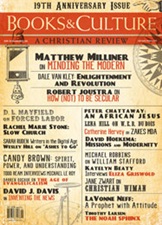David Hoekema: Missions and Modernity in Colonial Africa
 David Hoekema, “Missions and Modernity in Colonial Africa: Most of what you think you know is wrong” Books & Culture (September/October 2014), pages 32-33.
David Hoekema, “Missions and Modernity in Colonial Africa: Most of what you think you know is wrong” Books & Culture (September/October 2014), pages 32-33.
Hoekema’s short article considers the role of 19th Century missionaries to Africa, especially West Africa. Missionaries were good, but colonialists were bad, is in a nutshell his conclusion. Missionary-style subordination was self-limiting according to Hoekema; it was a kind of subordination of African nationals that had a clear end in view. The colonial way of working though, that has now become the ‘aid model’ engaging with Africa, “substitutes its own agency for that of the subordinate group and proceeds to exercise it on the latter’s behalf” (quote is of Táíwò cited by Hoekema).
How Colonialism Pre-empted Modernity in Africa is the title of the book by Táíwò that Hoekema draws on heavily in this article. The article could almost be a review of the book. Hoekema tells us that for Táíwò, modernity is rooted in subjectivity and individualism that arise when redeemed sinners acquire a new Christian identity. The key to modernisation is, according to this understanding, to promote missionary activity which engenders such subjectivity. The philosophical underpinning that underlies this understanding apparently comes from Hegel.
This article’s subtitle; “most of what you think you know is wrong”, shows that the author assumes his reader to start out with a negative valuation of missionary activities in Africa. He wants to correct this view. To Táíwò, and Hoekema, missionary work is the preferred model of intervention into Africa.
Reviewed by Jim Harries
Read “Missions and Modernity in Colonial Africa” at http://www.booksandculture.com/articles/2014/sepoct/missions-and-modernity-in-colonial-africa.html


